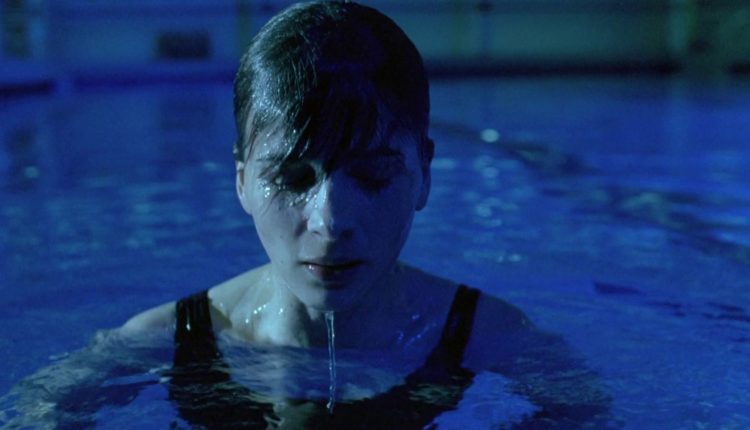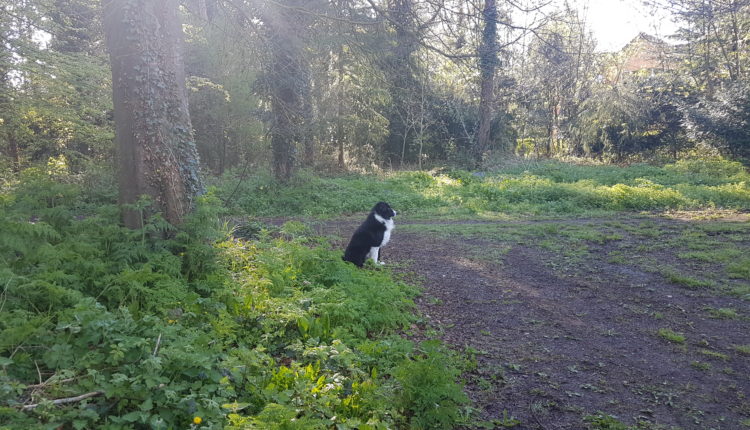Art Encounters | The Rescue Act III: The Broken Fence
All these changes everywhere,
Just go ahead and take my hand,
Hold me close, now let me go,
Try and understand,In Chains, The War on Drugs
It’s now a year since I travelled to the hills of Clare to adopt a border collie called Oscar; offering him a new home. I wrote two pieces (here and here) about the experience of rescuing a dog, and how it impacted upon me. Now, a year later, we both have a routine. I’m a dog owner with daily rituals. We walk in the woods every morning at 8 am. As a result, I feel so much closer to nature than I’ve ever felt in my life. I plod through the woods in every kind of weather imaginable. Every morning, in rain sleet or snow, I make my way into a circle of thought and contemplation. And every morning I meet an elderly neighbour Davey there with his two dogs. We chit chat, shoot the breeze, the dogs play with each other (have a bit of dog craic), and then we both retreat to our own little worlds. Oscar’s instinct, as a collie, is to feck off and return. For me, that he fecks off and returns is, however, cathartic: it seeps into my consciousness as the day begins. Things that go away will return. Isn’t that what we all want to believe?
Like Julie (Juliette Binoche) in Krzysztof Kieslowski’s masterpiece Blue (from the Three Colours Trilogy), who swims religiously every day to process the sudden death of her husband and child (and thus escape the blues,) I walk a dog everyday to process the shock I struggled with when writing The Rescue Act 1 and 2. I walk to process, to come through, a similar experience of sudden death to that which Julie experiences in Blue (when someone is taken away from you suddenly, without heed or warning). When Oscar came into my life this time last year, a year had passed since my father’s untimely sudden death. And when I wrote The Rescue Act 1, I wrote about a yearning to care for another being, to give shelter to another being as a way of caring for myself. I came to understand that by rescuing an abandoned dog, I could rescue a part of myself that felt abandoned. We came into each other’s life at the right time.

As last summer passed, as my morning ritual of walking five loops of the wood with Oscar became more pronounced, I began to consider the process of adopting Oscar as something that was meant to be, as strange as this may seem. I thought about finding Oscar as something that had purpose; that there was some greater narrative to the world of which I was a part. I kept thinking about provenance; that this dog had been sent to me from above. I wanted to believe this narrative, even though, deep down, I knew it was bullshit. I was struggling with the trauma associated with shock; a trauma that Julie gives such force to in the blank, often, sanguine, distillation of her being in Blue. Julie is trying to recover from the sudden death of her husband and daughter, trying to process what seems to lie so far outside the boundaries of human emotions.
Shock occurs when something is considered objectively true but isn’t felt as subjectively true. We can’t feel what we know is real. Shock, as a response to trauma, makes the distinction between the subjective and objective experience apparent. We can, for example, know someone has died without feeling the emotion that we should feel in the knowledge of this. We exist in a kind of netherworld, numbed to the pain that comes from loss while fully aware that we have experienced loss. The pangs of grief experienced in a state of shock take the form of short incisions from out of the blue. The membrane shielding us from pain and sadness is thinned, but the paradox is that our pain can only be felt through our identification with the experience of others: we experience our loss as a consequence of the loss we recognize in others.
Kieslowski’s Blue helps illustrate the difficulties involved in this. The film uses the colour blue to explore the idea of freedom blue stands for in the French tricolor. Blue stands for the fact that we are free as human beings. When someone dies we are suddenly faced with an idea of freedom; that we are independent from other beings. A natural response to death is to turn away from the world: to embrace a freedom to be alone. This is especially true of Julie in Blue, faced with the trauma of her family taken from her. Julie’s response is to embrace the freedom that is foisted upon her; to embrace the fact that she is alone. She seems cold and uncaring. She only begins to emerge from this, as the film progresses, when she comes to understand freedom differently. This change involves connecting with the experience of others. The change occurs when Julie cries at the end, having reconnected with her diseased husband’s work as a composer: the memory of her husband. At this point, when she understands her interconnection with other beings, she accepts the reality of death.
My father died on June 2016 in a car accident. I wrote the Art Encounters series for over a year without stating this fact directly. I wasn’t able to. Readers might have picked up, suspected something to this effect given I often referred to his death. I knew about his death as an objective fact but struggled to feel it subjectively: I struggled to feel loss. Writing the Art Encounters series was cathartic in that it was about the affects that break shock’s membrane. For there is a paradox in shock: we need affective triggers from outside to process emotion inside. In Blue Julie is unable to process this emotion until the end. The film is about her struggle to get to this point. Those who said Blue is about mourning are not quite right. It’s a film about something different. Blue is about the process we have to go through to be able to mourn.

The first summer spent as the ‘owner’ of an adopted dog called Oscar, I felt such joy in asserting our dependence on each other that I became preoccupied with the fantasy he was sent to me from above. I now look back on this as an obvious defence mechanism, used to dampen the despair that comes from accepting that loved ones are gone forever. A part of me believed that in death my father was still my protector; I had this fantasy that my Dad was pulling the strings to bring this creature into my life. The Art Encounters story A Dream, A Wave and Dante made further reference to this fantasy in a dream form; a dream about being rescued at sea by my father. The story was about being saved from death. My father performed the same kind of rescue act on me in the dream that I had written about in relation to a dog called Oscar. The dream was linked to the sense of security we lose when we lose our father. But the story was motivated, I can now see, by the fantasy that even in death our loved ones still protect us; that somehow, against what is known as true, our loved ones are still here.
Border collies are often referred to as ‘working dogs.’ Originating in the border region between England and Scotland, they were bred initially for herding sheep (hence some people still refer to border collies as ‘sheepdogs’). At some point they made their way to Ireland and became, over the centuries, stable features of the Irish landscape. A friend of mine who worked on a farming co-op in West Kerry as a student once said to me – long before I knew or cared much about this – that the collies that accompanied the sheep dogs to the co-op were essentially members of the family. When they died the farmer would take to the pub, and go through a mourning process not that different to when a human family member died. Because they were bred to stay close to the farmer at all times, border collies are generally known for their loyalty. They seek out companionship and they don’t like to be alone.
A few months ago I became worried. I’d open the side door to the house, call out for Oscar and hear a rustling in the trees that mark the territory between my house and the house of my ninety-year-old neighbour (let’s call him Jimmy) who lives alone. After the rustling Oscar would appear from the end of the garden, rustling out through a hole in the fence, excited and upbeat, yet at the same time almost conscious of the fact that he was being – if only slightly – disobedient. He was in next door. I rang Jimmy to ask if we should fix the fence to stop Oscar wandering in. He said he’d get his friend to do it. But as the weeks passed, and I rang again, I noticed the fence was still broken. That it hadn’t been fixed was out of character with Jimmy’s general fastidiousness – if he says something he does it. Then one day when I bumped into Jimmy outside the front of the house he saw Oscar and his eyes lit up. Oscar, in recognition, was upbeat too. Jimmy then praised Oscar’s behaviour, his lack of aggression and his remarkable gentleness. ‘Ah, he’s a great dog,’ he said, before adding ‘he loves the buttery mashed potato, and the cocktail sausages.’ I chuckled at the idea of the two hanging out in the yard, shooting the summer breeze. Later I joked with my wife that Oscar had found a pal. Then something strange happened that I only realised the significance of later: I found myself thinking about how much my Dad would have enjoyed this story. I imagined we were both sitting at my kitchen table, talking about the way a dog and a ninety-year-old man became friends. I could picture Dad turning to me and then saying – as he stirred his tea and laughed aloud – ‘leave the feckin’ fence as it is… isn’t Oscar a great companion for anyone?’
In the months following my father’s sudden death I remember feeling I didn’t want to be on my own but when I sought company in family and friends I craved to be on my own again. Not unlike Julie in Blue, I felt a pull into myself, a desire to turn away from the world. I was dazed and confused, somewhat helpless in the knowledge that something had gone and not come back. I don’t think that a dog changed all this for me. But I do think he helped prepare the ground that had to be prepared in order for me to mourn. Each day in the woods, in the dark of January or the light of spring, Oscar takes off in front of me and then circles back. This ritual, typical of a border collie, acts as a reminder that things that go away will most often return. My dog runs into the distance, I feel a little insecure as to where he might be gone, but then I feel a calming sensation when he returns to me. It might seem like a small thing but it amounted to a big moment: one day I realised I was chuckling away to myself, imagining my father was with me, happy, for a strange reason, that my fence was still broken.
